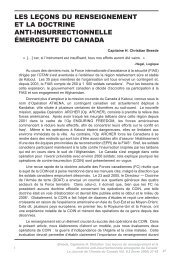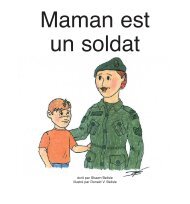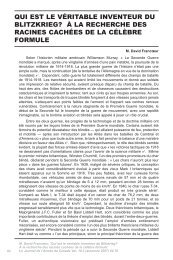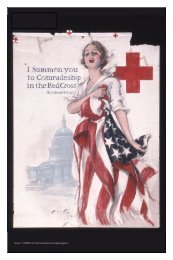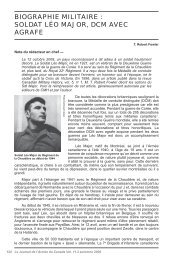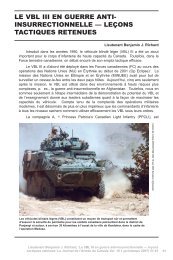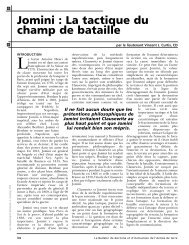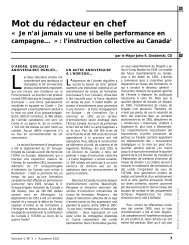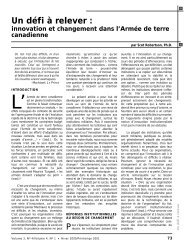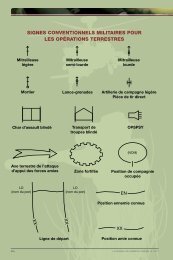The Canadian Army Journal
The Canadian Army Journal
The Canadian Army Journal
Create successful ePaper yourself
Turn your PDF publications into a flip-book with our unique Google optimized e-Paper software.
Thankfully, although hard-hitting in its conclusions, many of which are not without<br />
challenge and controversy, Kinzer’s book is not an ideological diatribe. He does not<br />
automatically equate US experience with Old World imperialism, nor does he assume<br />
that intervention automatically yielded worse societies or governments than would have<br />
otherwise been the case absent gunboat or dollar diplomacy (and he engages in a few<br />
scenarios of fascinating historic alternatives). At a time when history as a discipline is<br />
too often narrowed to the micro level in focus and detail or couched in esoteric language<br />
only accessible to academics, it has too often become the task of journalists to take on<br />
the sweep of history, and to spin a good yarn in the process, and Kinzer fits well into this<br />
mould.<br />
Overthrow is in reality three books in one. <strong>The</strong> first section, subtitled “<strong>The</strong> Imperial<br />
Era,” begins with the overthrow of Queen Liliuokalani’s rule in Hawaii and its eventual<br />
annexation as a US state through to US efforts in the Philippines, Central America and<br />
the Caribbean. <strong>The</strong>se adventures, Kinzer argues, were inspired by naval theorist Alfred<br />
Thayer Mahan, who argued that states become great via the access to trade and<br />
markets that sea power guaranteed, and Mahan’s approach was championed by the<br />
powerful Washington elite. <strong>The</strong> second section, “Covert Action,” details the post World<br />
War II efforts of the Central Intelligence Agency in operationalizing four coups that had<br />
lasting consequences for each of the states involved: the 1953 removal of Mohammad<br />
Mossadegh in Iran; Jacobo Arbenz Guzmán’s flight from power in Guatemala in 1954;<br />
the overthrow of Salvador Allende in Chile in 1973; and initial efforts at regime change<br />
in Vietnam in 1963 prior to large-scale US troop commitments. Clouded in judgement<br />
by the extreme anti-Communism of John Foster Dulles and his contemporaries, Kinzer<br />
bemoans the point that no one questioned the overriding premise on which all such<br />
operations were based, that the states in question were indeed in imminent danger of<br />
falling into Soviet hands. In retrospect, we know that the domino theory worked largely<br />
in reverse: in toppling authoritarian communism in 1989 in Eastern Europe rather than<br />
in ensuring the global success of the red menace. <strong>The</strong> third section, “Invasions,”<br />
discusses post Cold War interventions in Grenada and Panama, as well as post 9/11<br />
operations in Afghanistan and Iraq. In this last section, Kinzer is at his most damning,<br />
particularly as he recounts intelligence failures and American unilateralism leading up to<br />
the war in Iraq. Although he is more balanced in his assessment of Afghanistan,<br />
acknowledging the moral obligation of the US to help rebuild the state given its previous<br />
support for the mujahedin throughout the 1980s and the urgent necessity in keeping the<br />
area free from becoming either a terrorist safe haven or a leading producer of heroin, he<br />
remains critical of the means employed, particularly with respect to the turning of public<br />
and political attention from Afghanistan to Iraq.<br />
Much of Kinzer’s book is a detailed catalogue of the old adage-you reap what you<br />
sow. Had democratic opposition movements in Latin America, for example, not been<br />
rejected as challenging US interests but as largely reflections of local and nationalist<br />
concerns that they were, the more radical alternatives such as Fidel Castro in Cuba or<br />
the Sandanistas under Daniel Ortega would not have been successful or generated as<br />
much charisma and cachet in the process. Given situations where real or imagined<br />
violence was the only alternative seen by the US in its regime change operations, even<br />
greater violence was unfortunately seen as the only available means of challenging US<br />
power. In the end, Kinzer concludes that successful regime change has largely yielded<br />
catastrophic results, which in the long run have weakened rather than strengthened<br />
American security as a whole (p. 317). Democracy, although often wielded as a<br />
rhetorical instrument, was little promoted in the past and indeed more often than not<br />
democratically elected governments were overthrown and replaced with tyrants.<br />
Moreover, now that the Bush government has appeared to take democracy promotion<br />
seriously, it has done so in an uneven and contradictory manner.<br />
<strong>Canadian</strong> <strong>Army</strong> <strong>Journal</strong> Vol. 11.1 Spring 2008 145


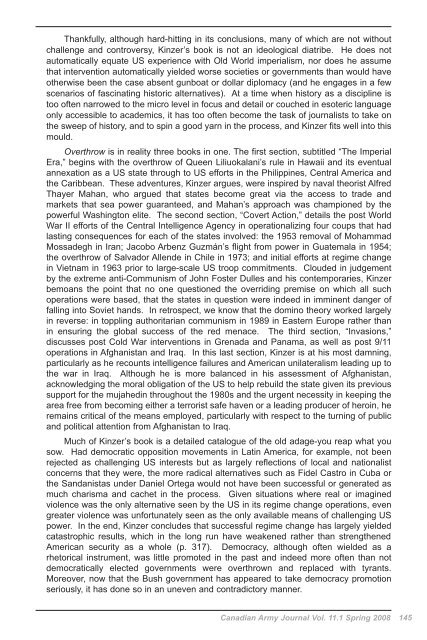
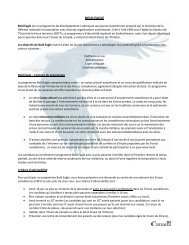
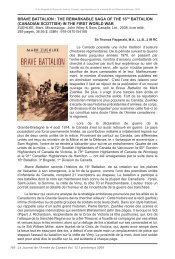
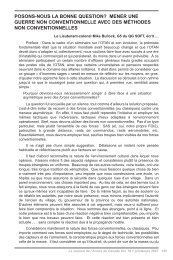
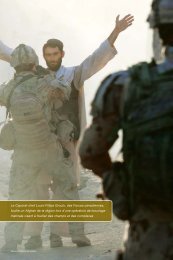
![La modularite dans l'Armee de terre canadienne [pdf 1.6 MB]](https://img.yumpu.com/17197737/1/188x260/la-modularite-dans-larmee-de-terre-canadienne-pdf-16-mb.jpg?quality=85)
